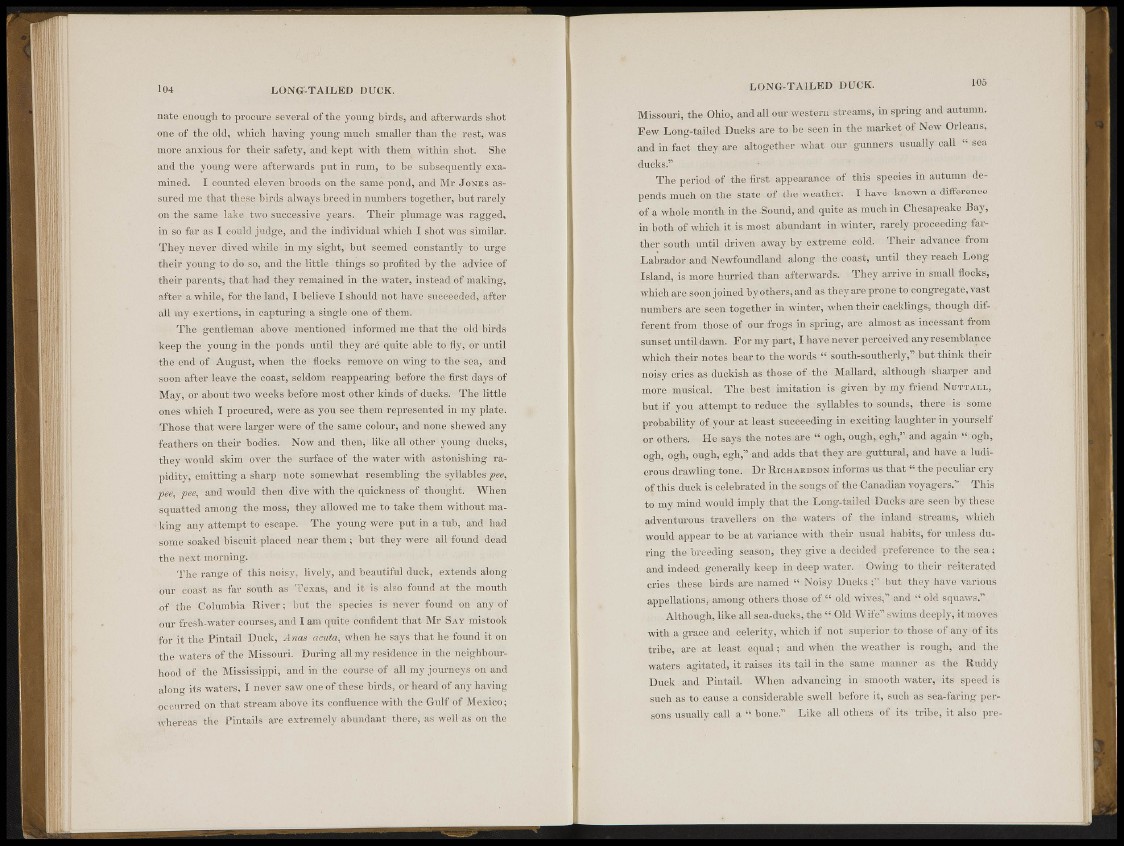
104 L O N G - T A I L E D DUCK.
»ate enough to procwe several of the \ (mug birds, and afterwards .shot
one of the old, which ha\ ing vtmngflauch smaller than the rest,; was
-more anxious for their safety,'¡ind kept with them within shot. She:
and the young were afterwards pu®n; rjnri, to he subsequently examined
I counted ole-Vcn broods on the same pond, -and Mr JONES assured
me that these birds always breed in numbers together, but rarely
(in the-same hike, (wo succcssive .years. Their plumage was ragged,
in so far as I could judge, and the individual which X shot was similar.
They never- dived while in -my sight, but seemed constantly to urge
their young to do so:, and the little things so profited by the advice of
their parents, that had they remained in the.water, instead of making,
after a while, for the land, I believe I should not have surci-eded, after
all iiiy exertions, in capturing a single one of them.
The gentleman above mentioned informed mC'-that the ohl; birds
keep: the young in the ponds until thoy ¡ire quite able to liv, or until
the end of August, when the flocks« removo-"on wing sea, and
soon after leave the coast, seldom reappearing before the first days''of
May, or about two weeks before most other kinds ofducks; The little
ones which I procured, were as you sec? them represented in my plate.
Those that were larger were of the same colour, and none Shewed any
feathers on their bodies. Now and then, like all other-young ducks',
thoy would skim over the surface of the water \vitli •astonishing rapidity,
fffmit ting Hsharp note siiftnewliat resembling the syllables/««,
pee, phi, and would then dive with the quickness of thought- When
squatted among the moss, they allowed mo to take- thorn without making
any attempt to escape. The young wore put in a tub, and had
some soaked biscuit, placed near thorn ; but they were ai! found dead
the. H&xt morning.
The range of this noisy, lively, and beautiful duck, extends along
our coast as far south a* Texas, and it is also found at the mouth
of the Columbia River; hut;-the'species is- never found-on any ot"
our fresh water courses, and 1 am quite1 confident that Mr SAY mistook
for it the Pintail Buck, Attas acuta, when lie says that he found it on
the waters of the Missouri. During nil my residence in the neighbour -
hood of the Mississippi, and in the course of all my journeys on and
along its waters, I never saw one of these birds, or heard of any having
ocearred on that stream above its confluence with the Gulf of Mexico;
whereas the Pintails are extremely abundant there, as well as on the
L O N G - T A I L E D DUCK. 105
Missouri, the Ohio:, and all our wostorarsu-eanis, in spring and autumn.
Sew Long-tailed Ducks we to be sisen in the market of New Orleans,
and in fact, they are altogether what our gunners usually call " sea
..ducks;"-.
•Clio period of the first appcanuicU'of this species in autumn depends
»uch on the state of the weather, I have!- known a difference
o f a whole month in the .Sound,-ami quite as much in Chesapeake Bay,
in both of which it-is most abundant in winter, rarely proceeding: farther
south until driven' away l)v extreme .cold:« Their advance from
Labrador:and Newfoundland along the-coasi>, until A e y reach Long
Island, is more hurried than afterwards. They arrive in small flocks,
which are soon joined by others, and as they are prone to congregate, vast
numbers are seoii together in winter, when their cackliags, though different
from thos.e;of our frogs ins spring, are almost as incessant from
sunset until dawn. For my part, 1 have never perceived any resemblance
whic.lt their notes bear to the words "south-southerly," but think their r
noisy cries as .luckisli as those of the .Mallard, although sharper and
more.musical. The best, imitation is-given by my friend NUTTALI.,
but if.-you attempt to reduce the syllables to sounds, theçei-is some
probability of-ymir at least succccding in exciting laughter in yourself
or others. lie says the notes .are " ogh, uugh, eglr," and again " ogh,
Ogh, ogh, ough,!«gh,"-and adds that they ¡ire guttural, and have a ludicrous
drawling tone. Dr RrcnAunsox -informs us: that " the peculiar cry
of this duck is celebrated in the songs of the Canadian voyagers." This
to my mind would -imply that the Long-tailed Ducks are seen b y these
adventurous travellers 011 the watftis of the -inland streams, which
would appear to be at .variance with their usual habits; for unless during
the breeding season, thoy give a decided preference to the sea ;
and indeed-generally keep in deep water. Owing to their reiterated
cries these, birds are.named " Noisy Ducks ;" but they have various
appellation») among others those- of " old wives," and " old squaws."
Although, like all suiniucdcs, the " Old Wi fe" swims deeply, it moves
with :a grace and celerity, which if not superior to those of any of its
tribe, are at . least equal ; and when, the: weather is rough, and the
waters agitated, it raises its tail in the same manner as the Ruddy
Duck and. Pintail. When .advancing in smooth water, its speed is
such as to cause, a considerable swell before it, suéh as sea-faring persons;
usually call a " bone." Like all Others of its tribe, it also pre